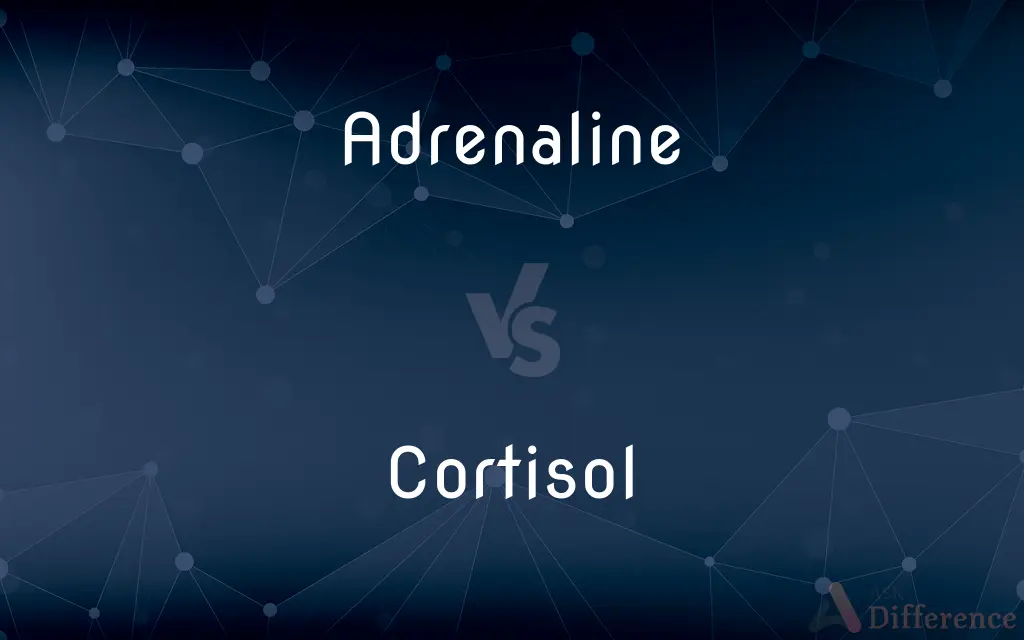Adrenaline vs. Cortisol — What's the Difference?
By Fiza Rafique & Maham Liaqat — Updated on March 25, 2024
Adrenaline, a fast-acting hormone, triggers the body's fight-or-flight response, enhancing physical performance temporarily. Cortisol, often termed the "stress hormone," manages stress over longer periods, affecting metabolism and immune response.

Difference Between Adrenaline and Cortisol
Table of Contents
ADVERTISEMENT
Key Differences
Adrenaline, also known as epinephrine, is produced by the adrenal glands in response to immediate stress or danger, leading to increased heart rate, elevated blood pressure, and boosted energy supplies. This rapid response mechanism prepares the body for quick, intense actions. In contrast, cortisol is released by the adrenal cortex under conditions of prolonged stress, playing a key role in regulating sugar levels, metabolism, inflammation, and memory formulation. While adrenaline acts swiftly to prepare the body for immediate action, cortisol works on a longer timeline, managing energy production, controlling inflammation, and modulating the immune system.
The effects of adrenaline are typically short-lived, designed to handle acute stress situations by enhancing physical capabilities for a brief period. Cortisol, however, has more prolonged effects, including altering glucose metabolism, suppressing the immune system, and helping the body manage stress over time. Though both hormones are essential for survival, their overproduction can lead to health issues. Excessive adrenaline can result in anxiety, hyperactivity, and heart damage, while high levels of cortisol can cause weight gain, hypertension, and a weakened immune response.
Adrenaline's role is often seen as immediately protective, providing the body with a burst of energy and strength. On the other hand, cortisol's function is more about maintaining homeostasis and ensuring the body's resources are used efficiently during prolonged stress. The balance between these two hormones is crucial for managing stress effectively, with adrenaline addressing short-term threats and cortisol handling long-term challenges.
While both hormones are critical in the body's response to stress, their pathways, timing, and effects differ significantly. Adrenaline's quick, short-term mobilization capabilities contrast with cortisol's longer-term, more generalized stress management and metabolic functions. Understanding these differences is key to appreciating how the body responds to various stressors and manages its resources under different conditions.
Comparison Chart
Primary Function
Triggers fight-or-flight response
Manages stress, metabolism, and immune response
ADVERTISEMENT
Effect Timing
Immediate and short-lived
Slower and longer-lasting
Key Effects
Increases heart rate and blood pressure, boosts energy
Regulates sugar, metabolism, suppresses immune system
Response Trigger
Immediate stress or danger
Prolonged stress
Health Implications
Anxiety, hyperactivity, heart issues (if overproduced)
Weight gain, hypertension, weakened immune system (if overproduced)
Compare with Definitions
Adrenaline
Quick stress responder.
Adrenaline surged through her as she sprinted to safety.
Cortisol
Affects metabolism.
Cortisol plays a key role in glucose metabolism and energy production.
Adrenaline
Acts rapidly.
Adrenaline acts within seconds to prepare the body for immediate action.
Cortisol
Long-term stress manager.
High cortisol levels indicated her prolonged stress.
Adrenaline
Enhances physical performance.
The athlete's adrenaline kicked in during the final lap.
Cortisol
Produced by the adrenal cortex.
The adrenal cortex releases cortisol in response to stress.
Adrenaline
Produced by adrenal glands.
In response to fear, the adrenal glands release adrenaline.
Cortisol
Known as the stress hormone.
Elevated cortisol can be a sign of chronic stress.
Adrenaline
Fight-or-flight hormone.
His sudden burst of strength was fueled by adrenaline.
Cortisol
Has broad effects.
Cortisol affects many bodily functions, from immune response to blood pressure.
Adrenaline
Adrenaline, also known as epinephrine, is a hormone and medication which is involved in regulating visceral functions (e.g., respiration). Adrenaline is normally produced both by the adrenal glands and by a small number of neurons in the medulla oblongata.
Cortisol
Cortisol is a steroid hormone, in the glucocorticoid class of hormones. When used as a medication, it is known as hydrocortisone.
Adrenaline
See epinephrine.
Cortisol
A steroid hormone (C21H30O5) active in carbohydrate and protein metabolism; - called also hydrocortisone. It is used in medicine as an antiinflammatory agent
Adrenaline
(hormone) epinephrine, the hormone and neurotransmitter.
Cortisol
An adrenal-cortex hormone (trade names Hydrocortone or Cortef) that is active in carbohydrate and protein metabolism
Adrenaline
Excitement; thrills.
Adrenaline
A hormone secreted by the adrenal medulla that acts as a powerful stimulant in reponse to fear or stress; it stimulates autonomic nerve action. It can be obtained as a crystalline substance, C9H13NO3. It is used in medicine as a vasoconstrictor (hemostatic) and cardiac stimulant, also to reduce allergic reactions and to stimulate the heart in cases of cardiac arrest.
Adrenaline
A catecholamine secreted by the adrenal medulla in response to stress (trade name Adrenalin); stimulates autonomic nerve action
Common Curiosities
What are the main functions of adrenaline and cortisol?
Adrenaline triggers the fight-or-flight response for immediate action, while cortisol helps manage prolonged stress by regulating metabolism and immune functions.
What triggers the release of adrenaline and cortisol?
Adrenaline is released in response to immediate stress or danger, while cortisol is triggered by prolonged stress.
What role does adrenaline play in physical activity?
Adrenaline boosts physical performance temporarily, enhancing strength and energy during intense activities.
How quickly do adrenaline and cortisol act?
Adrenaline acts rapidly, within seconds, while cortisol's effects are more gradual and sustained.
How do adrenaline and cortisol differ in their response to stress?
Adrenaline addresses immediate, acute stress, enhancing physical abilities. Cortisol responds to chronic stress by managing energy, suppressing the immune system, and maintaining homeostasis.
How does cortisol affect weight and metabolism?
Cortisol can increase appetite and signal the body to store fat, particularly in the abdomen, affecting weight and metabolism over time.
What can be done to manage high cortisol levels?
Managing stress through relaxation techniques, exercise, and healthy eating can help lower cortisol levels.
Can high levels of adrenaline and cortisol be harmful?
Yes, excessive adrenaline can lead to anxiety and heart problems, while high cortisol levels can cause weight gain, hypertension, and immune issues.
How do healthcare professionals address imbalances in these hormones?
Treatment may include lifestyle changes, medication, or therapy to manage hormone levels and address underlying health issues.
How do adrenaline and cortisol affect the body?
Adrenaline prepares the body for quick action by increasing heart rate and energy. Cortisol manages stress over time, affecting metabolism and the immune system.
Why is balancing adrenaline and cortisol important for health?
A balance is crucial for optimal stress response, immune function, metabolism, and overall health, preventing long-term damage from chronic stress.
What are the symptoms of an adrenaline rush?
Symptoms include increased heart rate, heightened senses, rapid breathing, and a surge of energy.
Can cortisol levels indicate stress levels?
Yes, elevated cortisol levels can indicate chronic stress, affecting the body's stress management and immune functions over time.
Is it possible to have low levels of adrenaline or cortisol?
Yes, disorders of the adrenal glands can lead to insufficient production of these hormones, affecting stress response and metabolism.
How are adrenaline and cortisol levels measured?
These hormone levels can be measured through saliva, or urine tests to assess stress response or health conditions.
Share Your Discovery

Previous Comparison
Resinous vs. Vitreous
Next Comparison
Graffiti vs. HieroglyphicsAuthor Spotlight
Written by
Fiza RafiqueFiza Rafique is a skilled content writer at AskDifference.com, where she meticulously refines and enhances written pieces. Drawing from her vast editorial expertise, Fiza ensures clarity, accuracy, and precision in every article. Passionate about language, she continually seeks to elevate the quality of content for readers worldwide.
Co-written by
Maham Liaqat













































